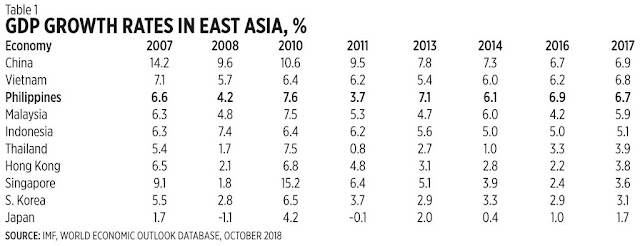* This is my column in BusinessWorld last Tuesday, January 29, 2019.
At the UP School of Economics Alumni Association (UPSEAA)
sponsored “Economic Briefing” on Jan. 25, the speakers were DBM Secretary
Benjamin Diokno and NEDA Secretary Ernesto Pernia. My former teacher in
undergrad and graduate economics, Sir Ben Diokno said in his presentation that
with high GDP growth in 2017 and 2018, “Duterte hit the ground running.”
During the open forum, I said that with growth of 6.9%,
6.7% and 6.2% for 2016 to 2018 respectively, it should be called “Duterte hit
the ground screeching and decelerating.” Compared to the ASEAN 6, our neighbors
have flat lining or increasing growth, only the Philippines has a declining
growth. Sir Ben said we should not include 2016 in the analysis because it was
an election year and all election years have higher growth than the following
years.
I checked the numbers and I found that he is partly
right, and partly wrong because we should include those election years in our
analysis. Below are growth rates for Philippine election years 2007, 2010,
2013, 2016, and the respective years after them (See Table 1).
The above numbers show that (1) In 2007, All 10 economies
had higher growth than 2008 because the latter was the start of the global
financial turmoil that started in the US; (2) In 2010, again all 10 economies
had higher growth than 2011 because 2010 was a recovery year after the
2008-2009 economic turmoil; (3) In 2013, all 10 economies except Vietnam and S.
Korea had higher growth than 2014; (4) In 2016, all 10 economies had lower growth
than 2017, except the Philippines.
In short, since 2016 was a bad year in the region
compared to 2017, Philippine growth should have retained if not surpassed the
6.9% growth, but the opposite happened.
I sustain my statement in my column last Friday, that
Dutertenomics is lousy in its macroeconomic management. Rising taxes, rising
inflation, rising interest rates, and declining growth.
One saving grace that Dutertenomics can do to help
reverse this bad trend is to ensure legislation of investments liberalization,
foreign direct investments (FDI) especially since these will bring in more
foreign capital and technology to blend with local capital and technology in
serving local market and labor force.
We have the lowest FDI inward stock among the important
East Asian economies. We have low volume of air passengers (many of them, from
domestic flights) and port container traffic, in TEU, 20-feet equivalent units
(See Table 2).
We need to liberalize the entry of more foreign airlines
and shipping lines because we are outside the Asian mainland and we are an
archipelago with many detached islands.
There are bills in Congress now amending the Public
Service Act (PSA, 1936). That 83-year- old law has many sectors listed as
“public utilities” and the 1987 Constitution prohibits foreigners from owning
more than 40% equity for these utilities.
In these congressional bills — HB 5828 (passed on Third
Reading) and SB 1754 (still a Committee Report) — telecommunications and
transportation will be lifted out of the list of “public utilities.” This means
foreign investors can own perhaps up to 100% equity in telecoms, shipping
lines, airlines, and possibly bus lines.
Last December, my family suddenly changed plans and
decided to travel to Iloilo. By then airfares were 2x, up to 4x their regular
rates. We need more competing airlines or more planes per existing airline to
have more flights on peak travel season, more planes require more investments.
So I decided to drive the car via RORO ships again. The
problem is waiting for many hours in the ports. We need more competing shipping
lines or more boats per existing shipping company. More big boats require more
investments.
If FDI and PSA liberalization are done by law before the
term of the current Congress is finished, it will be a big boost for
Dutertenomics and help pull the economy upwards in the next three years.
-----------------
See also:
BWorld 286, Henry Sy, a hero of Philippine capitalism, January 24, 2019
BWorld 287, Public transport mess and traffic congestion, January 26, 2019
BWorld 288, Economic prospects 2019 and cement tariff, January 28, 2019




No comments:
Post a Comment